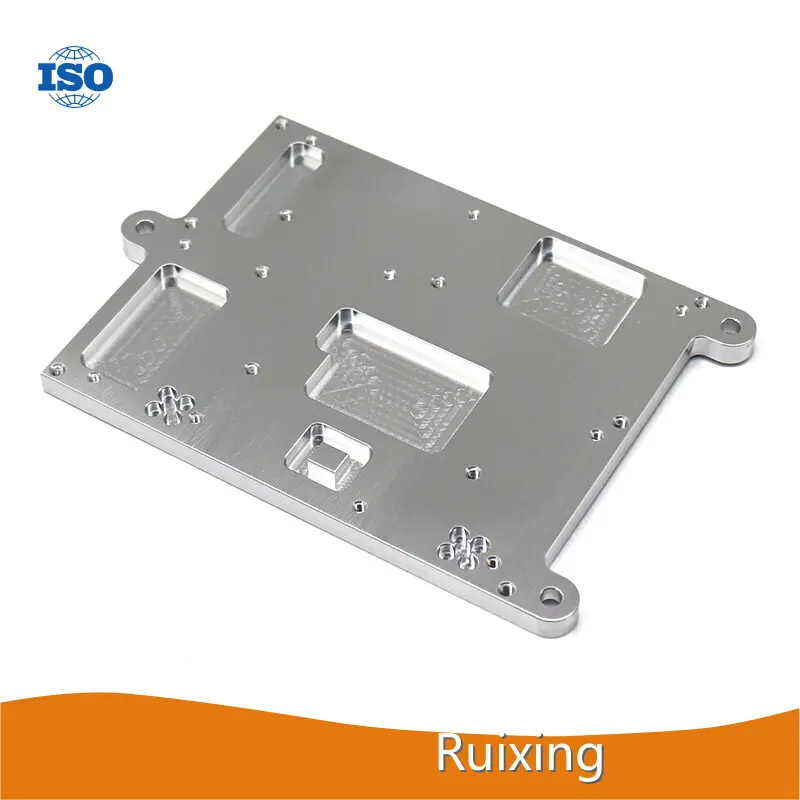Ruixing MFG - Custom CNC Machined Parts Manufacturer & Supplier For 20 Years
Aluminum Cnc Turning Parts 6061 Aluminum - - Ruixing
Product details of the aluminum cnc turning parts
Product Description
Ingenious design of aluminum cnc turning parts makes it favored by many customers. The quality of this product is controlled from raw material to every stage of production. The product has been well recognized with an integrated sales network in the domestic market.
Characteristic
1. Material Composition:
- 6061 aluminum alloy is employed, featuring a composition of 95.8% aluminum, 1.0% magnesium, 0.6% silicon, 0.28% iron, 0.2% copper, 0.15% chromium, and 0.1% zinc.
2. Tensile Strength:
- Tensile strength of CNC machined 6061 aluminum parts is approximately 45,000 psi, providing structural integrity and durability.
3. Hardness:
- The hardness of these parts, measured on the Brinell scale, ranges from 95 to 120 HB, ensuring a balance between machinability and strength.
4. Passivation Thickness:
- The passivation layer thickness is controlled within 0.0001 to 0.0003 inches, offering enhanced corrosion resistance without compromising the component's precision.
5. Corrosion Resistance:
- The passivation process significantly improves corrosion resistance, making these parts suitable for applications in corrosive environments.
6. Machinability:
- CNC machining of 6061 aluminum allows for high precision with a machinability rating of 90%, facilitating intricate designs and tight tolerances.
Advantages:
- High Strength-to-Weight Ratio:
6061 aluminum provides a favorable strength-to-weight ratio, making it suitable for applications where lightweight yet sturdy components are essential.
- Corrosion Resistance:
Passivation enhances the natural corrosion resistance of aluminum, ensuring durability in diverse environments.
- Machinability:
CNC machinability enables the production of complex and precise components with ease.
Disadvantages:
- Not Heat-Treatable:
Unlike some other aluminum alloys, 6061 is not heat-treatable, limiting its post-machining strengthening options.
- Limited Hardness:
The hardness range may be insufficient for applications requiring extremely high hardness levels.
Application
1. Precision and durability are paramount across industries, and CNC machined aluminum custom parts with passivation excel in diverse applications. In the aerospace sector, these parts play a crucial role in manufacturing components for aircraft structural assemblies, ensuring both strength and corrosion resistance.
2. Transitioning to the medical field, CNC machined aluminum parts find application in the production of surgical instruments. The precision of these components is essential for the accuracy and reliability required in critical medical procedures. Passivation adds an extra layer of protection against corrosion, enhancing the longevity of these instruments.
3. In the automotive industry, CNC machined aluminum custom parts contribute to the manufacturing of transmission components. The precision required for seamless gear transitions is achieved through these meticulously crafted parts. Passivation further fortifies these components, ensuring durability in challenging automotive environments.
4. Shifting to the electronics sector, CNC machined aluminum parts are integral in the fabrication of electronic enclosures. The precision and durability of these parts make them ideal for protecting sensitive electronic components. Passivation enhances corrosion resistance, ensuring the longevity of electronic devices.
Passivation
1. What is Passivation?
Passivation is a chemical treatment applied to metals, primarily aluminum, to create a thin, protective oxide layer on the surface. This layer acts as a barrier, preventing the metal from reacting with the surrounding atmosphere and inhibiting corrosion.
2. How Does Passivation Work?
The process typically involves immersing the metal component in a passivating solution, often an acidic mixture. This solution removes impurities from the metal's surface, promotes the growth of the protective oxide layer, and improves the overall corrosion resistance of the material.
3. Why is Passivation Important in CNC Machining?
In CNC machining, especially in the production of custom parts for OEM applications, passivation is essential for ensuring the longevity and reliability of components. It is particularly beneficial for materials like 6061 aluminum, enhancing their resistance to corrosion and environmental wear.
4. Benefits of Passivation:
- Corrosion Resistance:
The primary advantage is the significant improvement in corrosion resistance, crucial for components exposed to varying environmental conditions.
- Surface Protection:
Passivation creates a protective barrier, preventing the metal surface from reacting with external elements and maintaining its integrity.
- Improved Longevity:
Treated components demonstrate extended lifespan and reliability, making passivation a valuable step in CNC machining processes.
5. Limitations of Passivation:
- Process Sensitivity:
The effectiveness of passivation can be influenced by factors such as the composition of the metal and the specific passivation solution used.
- Not a One-Time Solution:
Passivation may need to be reapplied over time, depending on the material and the severity of the operating conditions.
FAQ
Company Feature
• While selling products, our company will arrange professional personnel to provide corresponding answering services for customers. By doing so, we can respond to customers' demands in a timely manner and solve them reasonably.
• Ruixing has a team of high-quality talents composed of many industry experts and R&D backbones to contribute to the production of more quality products.
• Ruixing's product sales network is spread across the capital cities of the country.
Ruixing's CNC Machining Services,Sheet Metal Fabrication are all qualified by national certification. If you have any needs, please contact us as soon as possible.









